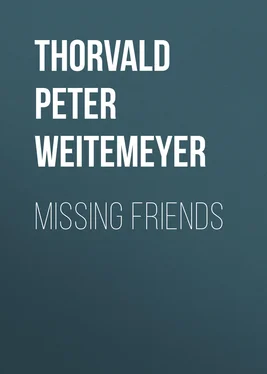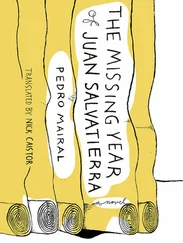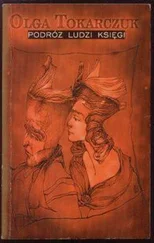Thorvald Peter Ludwig Weitemeyer - Missing Friends
Здесь есть возможность читать онлайн «Thorvald Peter Ludwig Weitemeyer - Missing Friends» — ознакомительный отрывок электронной книги совершенно бесплатно, а после прочтения отрывка купить полную версию. В некоторых случаях можно слушать аудио, скачать через торрент в формате fb2 и присутствует краткое содержание. Жанр: Путешествия и география, foreign_antique, foreign_prose, на английском языке. Описание произведения, (предисловие) а так же отзывы посетителей доступны на портале библиотеки ЛибКат.
- Название:Missing Friends
- Автор:
- Жанр:
- Год:неизвестен
- ISBN:нет данных
- Рейтинг книги:3 / 5. Голосов: 1
-
Избранное:Добавить в избранное
- Отзывы:
-
Ваша оценка:
- 60
- 1
- 2
- 3
- 4
- 5
Missing Friends: краткое содержание, описание и аннотация
Предлагаем к чтению аннотацию, описание, краткое содержание или предисловие (зависит от того, что написал сам автор книги «Missing Friends»). Если вы не нашли необходимую информацию о книге — напишите в комментариях, мы постараемся отыскать её.
Missing Friends — читать онлайн ознакомительный отрывок
Ниже представлен текст книги, разбитый по страницам. Система сохранения места последней прочитанной страницы, позволяет с удобством читать онлайн бесплатно книгу «Missing Friends», без необходимости каждый раз заново искать на чём Вы остановились. Поставьте закладку, и сможете в любой момент перейти на страницу, на которой закончили чтение.
Интервал:
Закладка:
Thorkill and I now retired into the cabin to eat the bananas, and while we ate them we had some conversation.
"I wonder what they all were laughing at?"
"Who shall say? Is—it—not—a—nuisance—that—we—do—not—understand—English—better? I—cannot—talk—to—them—at—all. You—seemed—to—do—fine—though. My—word—you—did. I—never—would—have—believed—it. I—will—study—that—language."
"Did you notice that he said, 'Dead mariner,' when he held the bottle up towards the sun?"
"Yes; now I should translate that as a dead sailor. I wonder what he meant?"
"Perhaps it is a slang name for a bottle."
"I do not think you will find that a correct explanation. It was a dark bottle; now, I am inclined to think that that sort of bottle may be used for some liquor peculiar to this country called 'Dead Mariner;' the same as in Denmark you have so many different names for nearly the same thing. In that way you might be right in saying it is a slang name; but anyhow, we will find out the true meaning of it some day."
"Yes," I replied to Thorkill, "and the sooner we find it out the better. Don't you see, the bottles may have a different value, and I should like to have full value for them. We are now in Queensland, Thorkill, and I do not intend to let any one fool me. So, before we sell to any one, I will find out exactly what they are worth. They did not laugh at nothing down there on the jetty. I am afraid he had too good a bargain."
"They seemed to say we would do well with the bottles," remarked Thorkill.
"I hope we shall. But see! They are at last going ashore. Now, if you take my advice, one of us will stay on board for another hour or two watching the bottles, while the other goes up to the town to find out their true value, and a customer for them."
Thorkill replied to this: "Ah, yes; you go up to the town. I will stay and watch the bottles. I am sure you can sell them to far better advantage than I."
Meanwhile, a number of the immigrants had gone ashore, and Thorkill and I were getting the bottles out of their hiding-places and putting them on the table. Some Queenslanders came in. They looked on a little. I said, "How much money you pay me for one bottle?"
"Have you got all these bottles for sale?" inquired one.
"Of course," said I.
He did not answer, but went outside and called out "Mick."
In came the man who had sold me the bananas.
"Do you want to buy any more 'dead mariner'?" asked the first.
"Has he got all these bottles for sale?" inquired the banana man.
"Certainly," cried I. (Of course, I did not make myself quite so easily understood as might appear from this conversation, but still I managed both to understand and to make myself understood on this occasion.)
"No," cried he; "he did not think he wanted any more just now."
"How much money you think I receive for one bottle?" inquired I.
"Oh, plenty money," cried he, "my word ready; market, any one buys them."
"What do they say?" asked Thorkill of me.
"They say the bottles are worth a lot of money."
"See if you can find out what 'dead mariner' is."
I took a porter bottle up, and then said, "You name that one 'dead mariner'?"
Queenslander: "Yes, certainly; that is one 'dead mariner.'"
I took up a clear bottle and inquired, "This clear thing, you call that empty bottle?"
Queenslander: "To be sure that is an empty bottle. But if you are willing to sell, you take them all up to that large hotel you see there. They give you half-a-crown apiece for them."
I then asked, "Which one is most costly, 'dead mariner' bottle or clear bottle?"
Queenslander: "Oh, that fellow—'dead mariner'—very dear; three shillings, I think."
"Heavens! here, we have made our fortune already, Thorkill," cried I. "Three shillings apiece for these bottles and two-and-sixpence for those. And it appears any one will buy. Are we not lucky?"
"Oh, but," said Thorkill, "I shall never feel justified in taking half of all that money. It was your idea. I should never have thought of it. I shall be very thankful to receive just a pound or two."
"Oh, no," cried I, "you shall share half with me whatever I get. But, excuse me for saying it, you are so unpractical. Why are we not up and stirring? Why are we sitting here yet? Remember time is money in this country." Then I ventured to ask the Queenslanders if in the town there was any one whom I might ask to assist us in carrying the bottles ashore.
"Oh, yes," they all cried, as if with one mouth. "You go up in town and get hold of a couple of black fellows, and then you take them all up that street you see there. Any one will buy them there."
Thorkill remained on board keeping watch over the bottles, while I went ashore to see what I should see.
Just as I came to the end of the long jetty I saw standing there an aboriginal and three Gins. They were about as ugly a set of blacks as I have ever since seen in Queensland, and I was quite horrified at their appearance. The man had on a pair of white breeches, but nothing else. The Gins were also so scantily dressed that I am afraid of going into details of their wearing apparel. All of them had dirty old clay pipes in their mouths, which they were sucking, but there was no tobacco in them. The gentleman of the party saved me the trouble of accosting him, as he came towards me and inquired my name. Then he informed me that his name was Jack. He next introduced me to the ladies, who, it appeared, all had the same name—Mary. Of course I fell in with the humour of this arrangement at once. It seemed to me a delightfully free and easy way of making acquaintance. They all spoke a lot to me, which I did not in the least understand, and I did the same to them no doubt. They asked me for tobacco, which I had not got; but it appeared that all was grist that came to their mill, for they asked in succession for matches, pipe, "sixpence," and I do not know what else, and even wanted to feel my pockets! Of course I did not like this familiarity, so I began to explain to them that I wanted them to work—to carry burdens from the ship. That was soon made clear to them. Then the "gentleman" of the party was very particular to know what I would pay him. I had thought to get them to carry the bottles up, and, having sold them, to pay them out of the proceeds; but as he seemed anxious to make a fixed bargain, I said, "I give you one bottle." In case he should have refused that, I intended to have gone on further, and to have offered a "dead mariner," but to my joy he accepted the offer with evident satisfaction, which again more thoroughly convinced me of the value of my bottles. I and the black fellow with his three Gins accordingly went back to the ship, where Thorkill sat keeping watch over our treasure.
I loaded the four blacks with four bags, in each of which were two dozen assorted bottles, and now we started for town in earnest. I thought it beneath my dignity to carry any bottles myself. I had exhorted so many of the immigrants that it was our duty to one another to try to make a good impression when we first landed, that the least I could do I thought would be to set a good example. Therefore I was faultlessly got up, in my own opinion, or at least as well as the circumstances of my wardrobe would permit. Still, my attire was not very suitable to this country, and indeed, when I think of it now, I must have cut a strange figure. I had on my black evening-dress suit, which so far would have been good enough to have gone to a ball in, but my white shirt, I know, was of a very doubtful colour, for I had been my own washer-woman, and it was neither starched nor ironed. Then my tall black hat, of which I was so proud when I got it, had suffered great damage on the voyage, and brush it as I would, any one might easily have seen that it had been used as a foot-stool. My big overcoat, I, according to the most approved fashion in Copenhagen, carried over my arm. In one hand I had my handkerchief, with which I had to constantly wipe the perspiration off my face, because it was very hot. Still, I felt myself a tip-top dignitary as I stalked along in front of the four blacks, who came, chattering their strange lingo, behind me.
Читать дальшеИнтервал:
Закладка:
Похожие книги на «Missing Friends»
Представляем Вашему вниманию похожие книги на «Missing Friends» списком для выбора. Мы отобрали схожую по названию и смыслу литературу в надежде предоставить читателям больше вариантов отыскать новые, интересные, ещё непрочитанные произведения.
Обсуждение, отзывы о книге «Missing Friends» и просто собственные мнения читателей. Оставьте ваши комментарии, напишите, что Вы думаете о произведении, его смысле или главных героях. Укажите что конкретно понравилось, а что нет, и почему Вы так считаете.












